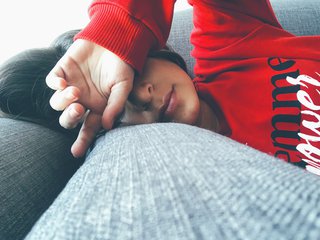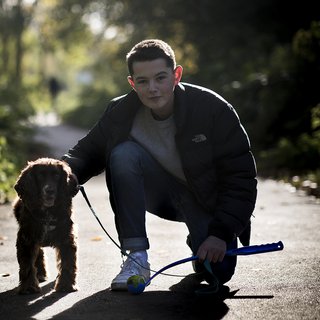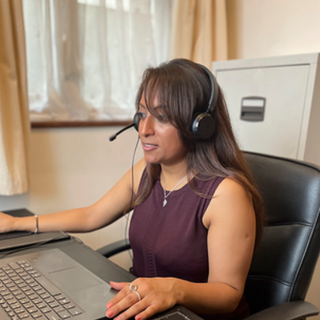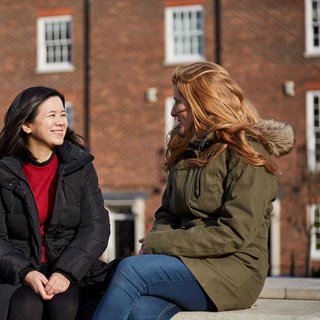Young adults: treatment side effects
Blood cancer treatment can cause some unwanted effects called side effects, which can make life difficult for a while.
Your healthcare team can help with side effects by giving you medication or adjusting your treatment, so don't hold back - tell them how you're feeling. And sometimes, something as simple as a ginger biscuit can make all the difference...
Hinna and Leanne talk about managing the effects of blood cancer treatment:
Here's a list some of the most common side effects of blood cancer treatment. You won’t get all of these side effects – everyone is different and reacts in different ways, even if they have the same treatment.
Extreme tiredness
You may have fatigue, a kind of tiredness that doesn’t get better with sleep. It can last for several months after your treatment has finished. A bit of gentle exercise can help.
With exercise, you’ve got to find the level that’s right for you. I walk the dog – it gets me up in the morning.
- Leanne
Weight changes
You might lose weight because you don’t feel like eating. If you take drugs called steroids as part of your treatment, you might temporarily put on weight. You might also eat more because steroids make you feel hungrier than usual. We have more information about coping with changes to your body or appearance.
You might put weight on when you take steroids. But remember you’re not going to be on them for ever.
- Emily
Muscle weakness
You may find it’s harder to do simple activities like climbing stairs. This can happen while you’re taking steroids or some anti-cancer (chemotherapy) drugs.
I couldn’t even walk five metres to the toilet. But three months later I was going to night clubs.
- Jamie
Hair loss
Some chemotherapy drugs can cause hair loss, including your eyebrows and eyelashes. How long it takes to grow back varies, but for most people it’s a few months.
I cut my long dark hair off and gave it to charity, because I was trying to make a negative thing into a positive.
- Hinna
NHS wigs
Synthetic wigs are available on prescription from the NHS in Scotland, Wales and Northern Ireland, so you should be able to get one for free.
In England, you’re entitled to a free wig from the NHS if you’re aged 16 to 18 and in full-time education, are a hospital inpatient, or on a low income.
We have more information about getting a wig and other ways to cope with hair loss.
Skin changes
Your skin can become sensitive or itchy and it might change colour slightly. You can also find you bruise more easily. Taking steroids can lead to stretch marks, and you may have small scars from tests or treatment.
I’ve noticed with leukaemia I’ve gone paler. I’ve changed my make-up so you can’t see the join.
- Leanne
Changes to your nails
Your nails may change colour or get thinner. You might see lines and spots caused by chemotherapy, but these will grow out.
Changes to your sense of taste
Chemotherapy can have a surprising effect on how food and drink tastes, and this can put you off certain foods. A change to your sense of taste can also be a symptom of coronavirus, so always tell your healthcare team.
Always take mints to chemo because it can give you a weird taste in your mouth.
- Emily
Sickness and vomiting
Feeling nauseous and vomiting are common side effects of treatment. Your healthcare team will give you anti-sickness drugs called anti-emetics to help with this. There are lots of options so if one doesn’t work, you can try another one.
Don’t come off the anti-emetics too quickly because you’re not feeling sick for a reason. And the reason is the anti-emetics.
- Jamie
Constipation
Chemotherapy can affect your bowels and some people have difficulty pooing. Your nurse can advise you on this but eating a healthy diet and taking laxatives will help.
You don’t realise how much you miss a good poo until you can’t have one!
- Hinna
Sore mouth or gut
Blood cancer treatment can make your mouth or gut sore (mucositis). Painkillers will help with this and it should get better as your body recovers from each round of chemotherapy.
Infection
If you have chemotherapy you may have a higher risk of getting infections like colds, flu, chest infections, and thrush. Sometimes an infection can develop into a serious condition called neutropenic sepsis which needs treatment straight away. You're also more at risk of serious illness if you get coronavirus.
My sore throat turned into neutropenic sepsis. Call your hospital straight away if you have an infection to check if you need help.
- Leanne
Chemo brain
Chemotherapy can affect your memory and make it difficult to concentrate, sometimes called brain fog. It may last longer than the treatment but should improve over time.
With chemo brain you just have to explain why you’re a bit forgetful and slow.
- Hinna
Loss of feeling (neuropathy)
Some drugs can make you lose feeling in your fingers and toes, or give you pins and needles or sometimes pain. Changing your drug doses can help with this, so talk to your nurse or doctor. We have more information about nerve damage (peripheral neuropathy).
Loss of interest in sex
Sex may be difficult because you don’t feel well, are too tired, or just don’t feel like it. Sometimes, the drugs you’re taking can affect your hormones, so if you have symptoms that are bothering you, speak to your doctor or nurse.
Find out what Leanne has to say about sex and chemotherapy:
Fertility issues
Some blood cancer treatments can affect your ability to have a child in the future, but there may be ways to increase your chances of having one when you’re ready. Speak to your healthcare team about your options as soon as you can. We have more information about fertility, including ways to preserve your fertility.
Hinna talks about being offered the chance to freeze her eggs:
More about infection
Blood cancer affects your immune system, the blood cells and organs that fight infection and keep you well. Treatment can also make your immune system weaker.
If you have blood cancer, you could be more likely to get infections (such as chest infections) and viruses (like colds and flu). Your risk of getting seriously ill from coronavirus is also higher than for someone else your age.
With blood cancer, infections can get worse quickly. There's also a risk of something called neutropenic sepsis if an infection isn't treated in time. This is a serious condition which needs hospital treatment.
Contact your healthcare team straight away for advice if you think you have symptoms of infection:
- fever (temperature higher than 38°C)
- low temperature (less than 36°C)
- shivering
- sweating
- feeling confused
- a sore throat or cough
- rashes or swelling
- frequent watery poos (diarrhoea)
- a burning or stinging feeling when you pee
- fluid (discharge) with an unusual smell, colour or texture in your vagina, or itching in or around your vagina
- an unusually stiff neck
- achy, flu-like symptoms
- generally not feeling well.
Coronavirus has made everyone more careful about washing their hands and keeping their distance, and staying away from everyone if they have any symptoms. This is a good thing, as it lowers your risk from infections in general, not just coronavirus.

Find out more about side effects
Tips and real stories about side effects like hair loss, peripheral neuropathy, brain fog, sleep problems, infection risk, nausea and sore mouth.
Most people who have blood cancer, or people who've been treated for it recently, are "clinically extremely vulnerable". That means more at risk of getting seriously ill with coronavirus.
If you're clinically extremely vulnerable, you're advised to stay at home (shield), and go out as little as possible. That's true even if you've had the coronavirus vaccine. The vaccine will give you some protection, but less than someone who doesn't have blood cancer.
So even when lockdown starts to relax where you live, your healthcare team might still say it's best to shield. That'll be until more people are vaccinated and the number of cases of coronavirus drops a lot more.
We have more information about coronavirus and blood cancer including practical support you can get if you need to be extra careful about going out.
We also have information on emotional support during the pandemic. It's really important to look after your mind as well as your body. Many young people are struggling in the pandemic, so however you're feeling - isolated, frustrated, sad, angry, numb - you're not alone.
Don't wait to get help though. If you need to talk to someone, call our Support Services Team on 0808 2080 888 or email [email protected]
Other places to get help and support
Help with fatigue
Children's Cancer and Leukaemia Group
A charity that funds research and provides information and support for children and young people with cancer.
Cancer on board
Sends out a badge so you can let people know you have cancer, without having to say.
Help with diet and exercise
Trekstock
Offers advice for younger people on living healthily after cancer treatment.
Help finding a wig
Little Princess Trust
Offers free real hair wigs for anyone with cancer (male and female) up to the age of 24.
Help with physical and emotional well-being
Look good feel better
Offer support with appearance-changing side effects for women and men undergoing cancer treatment.
Help with fertility issues
CLIC Sargent
Provides social and community workers in many specialist TYA (teenagers and young adults) treatment units around the country.
Future Fertility Trust
Offers the chance to freeze ovarian or testicular tissue if other ways to preserve your fertility aren’t an option.
Help to meet other young adults with cancer
Teenage Cancer Trust
Provides opportunities for young people aged 13 to 24 with or after cancer to meet others in similar situations.
https://www.teenagecancertrust.org/get-help/how-we-can-help/support-programmes

Help others by sharing your story
Having blood cancer can feel very lonely. People say that it helps to hear from others in a similar situation - how they feel and how they're getting through it. You can help by sharing your story, when you're ready.
Our videos
The videos on this page were shot before the coronavirus pandemic. Some activities described might not be possible at the moment. See our guidance on staying safe.



